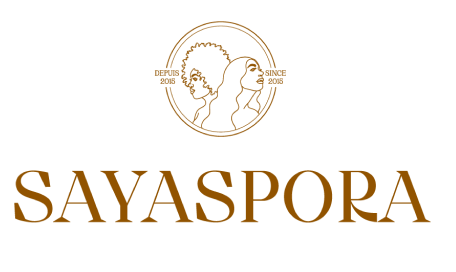February 4, 2016

By Sayaspora
Paola Mathe is a woman who wears many hats. She is a blogger, an entrepreneur, a photographer and an overall amazing human being. Paola is the Founder of Fanm Djanm, which means “Strong Woman” in Haitian Creole. Her brand carries a wide collection of gorgeous headwraps, clothing and accessories that seek to celebrate the strength and diversity of women worldwide. We met Paola back in December, during her visit in Montreal at Marche Coloré, a pop-up concept store, that brought together original pieces by designers who share a passion for patterns, textiles and colors. Our encounter with Paola was unexpected, unplanned. What was supposed to be a “quick interview” turned into a Photo-shoot, a full day of laughter & of engaging conversations over drinks and Thai food! What struck us was the easiness that was felt while chatting, the feeling of having known her for a while. It is refreshing to meet entrepreneurs who fully embrace the essence of their brand. We discussed entrepreneurship, blackness, sisterhood & the importance of self-representation.

SAYASPORA: Can you tell us about your journey between your childhood, Haiti and your life in the USA?
PAOLA: When I was in Haiti I was known as the “Tall Awkward Shy Girl”. Getting an education was what was instilled in me from a very young age. I didn’t say much to people, I really just buried myself in books and went into adventures in my head. Then when I came here in the USA, and I decided to be more adventurous and take risks.
SAYASPORA: How and when did you decide to start Fanm Djanm?
PAOLA: Famn Djanm started in April 2014. It was an accidental event. I wouldn’t know what to say…it has just been an amazing journey! Head wraps became part of my personal style, and the idea of wrapping my hair made me feel beautiful and more confident in general. The standard of beauty in Haiti is very skewed to the point where someone who looks like me would want to have different features, different hair, different skin color. So when I came here, I started changing my hair, I would put on a straight weave and it was a way for me to find that beauty, but I never felt beautiful that way. No matter how well my hair was done and no matter how many compliments I got.
Once I started understanding who I was, I asked my mom in high school to shave my head. I walked in school and people made fun of me for a week and then they got used to it. That’s when I realized that it is not about what people say, it is about how you feel. I felt beautiful with my short hair and then I started wrapping my hair and that’s where everything started. People just started describing me as the tall girl with either the African hairstyle as they would call it or the head wrap.

SAYASPORA: What pushed you to name your brand Fanm Djanm knowing that it means Strong Woman in Haitian Creole?
PAOLA: Famn Djanm originally was supposed to be a video. It was supposed to be a way to show the strength of women and how we carry it differently. I wanted to feature a lot of my friends who inspired me but who were also very different. I never found a concise way of putting that video together, because I wanted it to be short, to the point and powerful. So, when I decided to launch my head wrap company, I decided to connect the two, it had to be Haitian creole. Haiti is not a place that’s on the map when it comes to beauty, or when it comes to natural resources. Whenever we talk about Haiti, it is about some disaster or about something bad that happened. When I decided to name the brand Fanm Djanm, I thought: What if people around the world started saying Fanm Djanm? Because Fanm Djanm is in Haitian creole, you can deny that. And that is beautiful to me. To have someone from Australia saying I am a Fanm Djanm and the fact that they know its Haitian Creole.
And to go into the whole strength of women, it is something I am discovering every day. I met you and anyone else and every time I meet a new person, it really strengthen the brand. And that’s what it is all about. We might have a bunch of different thoughts about life. And that is beautiful. There are a lot of campaigns that have only one black girl to represent the whole community, the “token black girl”, yet there are so many different types of black girls. There is something so interesting and different about each and everyone of us.
SAYASPORA: What does womanhood mean to you? How does sisterhood manifest into your brand and how does your understanding of it translate into your work?
PAOLA: Womanhood is important to me because it is so complex. There are all these rituals that go with being a woman: the way we handle things, the way society views you, the way society tries to shape a woman etc … It is something I am figuring out every single day, because with womanhood comes sexuality and with womanhood comes all of these different components.
The women I have surrounded myself with for example have as their whole focus, sex. And it is so funny because we are in a society where if a woman is too interested in sex, then something is wrong with them. We are told to carry ourselves a certain way, and this brand really taught me that there are so many different ways to live our life and you could still be just as interesting and that is what womanhood is to me. That there is no real, concise definition. There is a lot that makes us women.
When it comes to sisterhood, I use this sentence a lot on my social media: “Sisterhood is important, it can change the world.” It might seems like it is a big statement in terms of changing the world, but if women come together and support each other, as I have seen from my company, you really can make a big impact in the world. There are so many things that are unnecessarily diving us: thick vs thin, light vs dark, classy vs slutty etc… But coming together is really key. The fact that all 5 of you coming together. You are making an impact. This is what sisterhood is to me. And it can only grow.
SAYASPORA: Our mandate is to engage in our representation as African women part of the contemporary African diaspora. What place do you think Afrodiasporians should have in the media in terms of self-representation?
PAOLA: A lot of the photographs I have created and directed were images that I wish I saw when I was a little girl. When I was a little girl there were so many things about me that I wanted to change. So by creating these images, say a ballerina, in a garden, who happens to be black, with a head wrap is important. Seeing this as a little girl, I would have already thought that I was magical and that I could accomplish a lot of things.
Our representation in the media is extremely important. I am also the kind of person to say that the media shouldn’t raise our children. We are fully responsible for the education of our children. However, you can’t escape the media, there is no way you can. Representation is important. We are powerful and that is a message that I am trying to convey every single day.
Providing the platform that you are having for example, is important.
Once, we start making that difference and taking a role in that change, just like with the natural hair movement, that we’ve made happen, we will see that change. It is our time to be in control, whether people want it or not. We have a voice too, we have dollars, they matter and we exist. And that’s the only reason needed really. It can only grow, if we persevere.
SAYASPORA: As a woman from Haiti, what were the challenges that you faced entering the business world and how did you own your place in a field that is traditionally predominantly white and masculine. Lastly, do you have any advice for rising Afrodiasporian entrepreneurs?
Lately, I haven’t been focused on being the black woman in business.
I have been focusing on being a good business woman. When I came to the United States and got my education, I realized that I was a privileged black person, because I was able to reach certain people that most black people in my entourage weren’t able to reach. And because I realized I was a privileged black person, it was also part of my duty to represent and leverage my community. I think that it is important. A lot of black educated people that have reached a certain social status often think that because they have “made it”, then their black counterparts should be able to make it too. And that is not true.
I have been to an all black high school in New Jersey, New York and I know for a fact that we are oppressed. I know for a fact that it is difficult. Of course, I worked hard to be where I am, but when you are raised from not knowing better, from your parents being oppressed so many times, it is difficult. Yet, you still have people saying that “slavery happened a long time ago and to get over it”. It is ridiculous. As a business woman now, the advice I can give to people is to get an education, travel, meet a lot of people, and don’t make decisions based on what people say, experience life, make your own informed decisions, it matter. A lot of things in the business field are about connections, who do you know. And a lot of the time we don’t get these opportunities, so it is not only about being educated at school but also in life experiences in general and also focusing on being the best person you can be as opposed to being the best black person. I want people to say about my brand that : this is a good business, as opposed to: this a a good black business. I am proud of being black, I celebrate my blackness daily but I want to be put in the same category as everyone else.
Find more about Paola:
www.fanmdjam.com // Instragram @fanmdjanm
www.findingpaola.com // Instagram @findingpaola
Images credits:
Joey Rosado // www.islandboiphotography.com
Christian Atanga // www.mydaytodayinspiration.com
Similar articles

September 18, 2024




